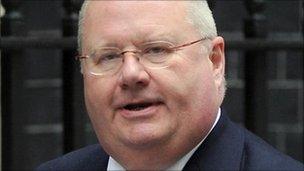Local partnerships in spotlight
- Published

Eric Pickles has said he wants to return power to local authorities
The complex arrangements for Local Enterprise Partnerships (LEPs), which will replace the dismantled Regional Development Agencies, have been investigated by the Politics Show in the East.
The LEPs are formed from councils and clusters of business leaders and aim to encourage growth by giving local firms access to public funds.
So far four LEPs have been approved in the East but large parts of the region remain uncovered.
Other areas, particularly economic hotspots, like Stansted Airport, are also being claimed by more than one LEP.
The bids so far approved include Essex, which is looking south to a partnership with Kent and East Sussex, while Peterborough and Cambridgeshire join with Rutland.
Hertfordshire has formed a stand-alone LEP and Bedfordshire, along with parts of Northamptonshire, is looking north to the South East Midlands LEP.
Norfolk and Suffolk have submitted a bid to form an LEP which has yet to be approved.
Leicestershire's bid will include parts of Northamptonshire, like Wellingborough, in their "crossroads of England" LEP application.
The Partnerships have to be approved by the Department of Communities and Local Government, which is headed by Essex MP Eric Pickles.
The Secretary of State told 91Čȱ¬ East: "What we wanted was something that was much closer to the economic areas.
"LEPs are voluntary arrangements for businesses, academic institutions and local councils together, to work out a strategic plan for a real economic area.
"I think there are some really absolutely corking schemes, particularly in the Essex, Kent and East Sussex LEP.
"It is the kind of economic area that I think is going to dominate the country and dominate Europe in terms of its economic importance."
'Very powerful voice'
He added: "I think it's going to ensure that in the old eastern region, who always thought they were going to be ignored, this is going to give them a very powerful voice."
Business Secretary Vince Cable has designed the Local Enterprise Partnerships but has admitted to Parliament's Business Select Committee that the new organisations would not be able to access any central government money to help them start up.
Instead they will have to look to local authorities for funding.
A week ago Mr Cable described the abolition of the eight RDAs as "a little Maoist and chaotic".
He added that the scrapping of the RDAs had been poorly executed, although he still supported the transfer of power from Whitehall to the regions that they represented.
'Poorest wards'
The abolition of the RDAs is expected to cost the taxpayer about ÂŁ1.4bn in wind-up costs over four years, a process that will coincide with a sale of land and building assets.
Meanwhile, the coalition has announced a Regional Growth Fund of ÂŁ1.4bn to stimulate enterprise over the next three years, directed particularly at communities that are currently heavily dependent on the public sector.
It is feared that the East, which has a higher proportion of private sector jobs, will miss out.
But Mr Pickles disagrees, adding: "That isn't true because 3,000 of the poorest wards in the UK exist in the south.
"One of the poorest wards in the country is in Nelson in Great Yarmouth and in Essex there's Jaywick.
"We have to recognise that in areas of enormous growth there are pockets of deprivation we have got to address."
- Published7 September 2010